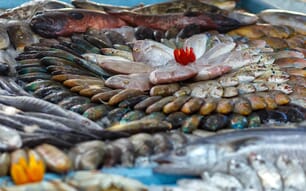Report Highlights:
The project assisted BiH in acquiring a license to export fish products to the European Union and increasing production by 12 per cent. BiHs annual fish production is approximately 8,000 tons. The country has great potential to expand production. Investing in fish processing capacities could be a good opportunity for foreign investors.
General Information:
Executive Summary Bosnia and Herzegovinas (BiH) State Veterinary Office (SVO) is one of the winners of FAOs 2010-2011 Edouard Saouma Award for its outstanding contribution to the implementation of the Technical Cooperation Project for Strengthening Capacity on Aquaculture Health Management.
The project Strengthening capacity on aquaculture health management was launched to improve national capacities to support sustainable and healthy aquaculture production, both for domestic consumption and trade. The project focused on policy and national aquatic animal health (AAH) strategy, European Union (EU) trading and AAH, risk analysis in aquaculture, product safety and quality assurance, and diagnostics, surveillance and reporting of aquatic animal diseases.
As a result, the SVO developed a draft national AAH management strategy, a disease diagnostic manual for extension workers and a veterinary inspectors checklist for aquaculture farms and fish processing plants, all published in local language and disseminated. The national AAH reference laboratory was strengthened through overseas training and provision of equipment.
These activities assisted the country in acquiring a license to export fish products to the EU market. In 2008, EU has approved four fish processing facilities from BiH for export. According to FAO, BiH aquaculture production increased by 12 per cent during the project (from July 2006 to May 2008) and export of fish products to the EU commenced. The veterinary administration, inspectorates, laboratories and producers have improved compliance to international animal health, food safety and quality requirements and practices.
The SVO developed a risk-based approach important for drafting monitoring plans for aquaculture, aquatic animal health and food safety, and for decision making concerning domestic and international movements of live aquatic animals and their products.
Background
BiH has more than a century-long tradition of aquaculture of salmon and carp species. The 1992-1995 war significantly damaged aquaculture production, but this sector has improved due to efforts of the producers and the government, specifically in relation to the number of food fish species in production, technology, management and marketing. Certain problems in production still remain, largely resulting from the way in which the state has been organized. BiH comprises two entities at government level: the Federation of Bosnia and Herzegovina and the Republic of Srpska. This makes it difficult to ensure complete control over production and protection. For example, BiH does not yet have a ministry of agriculture at state level, nor are there laws on fishery and aquaculture, on sport fishing or on concessions. The agency in charge is the State Veterinary Agency, under the Ministry of Foreign Trade and Economic Relations.
During the last decade, the overall conditions for production and processing of fish were improved. These included the availability of high quality feed, new technology, expansion of capacity and the establishment of producers' associations. Fish producers have established good communications and have established several business arrangements with foreign (Norwegian) investors.
In BiH, fish farms are located in three main regions. In northern Bosnia, in the Republic of Srpska, there are five carp fish farms with a total area of 3,276 hectares. In the Neretva and the Vrbas river basins (mainly in the Federation of BiH), there are about 40 concrete salmon fish farms of 8.5 hectares. and 14 salmon cage fish farms of 8.1 hectares. BiH has about 20 kilometers of seacoast. Marine aquaculture is practiced in Neumin where there are two cage farms, with a total area of 3.6 hectares.
In December 2008, the EU permitted BiH to export aquaculture products to EU member States thanks to the implementation of the Aquaculture Residues Monitoring Plan. In 2004, the EC added BiH to the list of CD 2004/432/EC countries with approved aquaculture plan. Following the entrance into the list, representatives of BiHs Veterinary Office together with representatives with authorized entity level bodies carried out the control of fish farms potentially interested for export. Based on this control, the Veterinary Office authorized four companies (Tropic Aquaculture, uvela HB, Laks and Norfish-Blagaj) to export aquaculture products to the EU.
Bosnia and Herzegovina Aquaculture (2007-2008)
| Production (000)t | ||
|---|---|---|
| 2007 | 2008 | |
| Californian trout | 3,840 | 3,960 |
| Carp | 2,380 | 2,385 |
| Chinese Carps (white amur, silver carp and bighead carp) | 780 | 785 |
| Sea fish (sea perch, dentex, gilthead) | 215 | 220 |
| Fresh waters trout | 88 | 92 |
| Shells (oyster, mussel) | 84 | 87 |
| Catfish | 25 | 28 |
| Freshwater rainbow trout | 25 | 25 |
| Pike Perch EndFragment | 5 | 7 |
Processing capacities are small and include freezing and packaging operations and production of fish fillets. There are two plants for fish processing in Salakovac and Banja Luka, which use modern technology and have an annual capacity of approximately 3,000 tones. Investing in fish processing capacities could be a great opportunity for foreign investors.
Of the total production of food fish, approximately 65 per cent is destined for domestic consumption in bigger cities, such as Sarajevo, Banja Luka, Mostar, Tuzla, Bihac and Zenica. The remaining 35 per cent is exported to Serbia, Montenegro, and small amount to Croatia. Common carp, grass carp, and rainbow trout are the main exports. BiH exports these species mainly fresh, with a small portion (15 tons) exported smoked.
Supermarkets and specialized fish markets are the main outlets for fish and products. Current consumption is estimated to be 2-3 kg per capita annually and is constrained by the difficult economic situation and high unemployment rates, which are not likely to improve in the near future.


